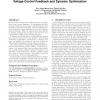Free Online Productivity Tools
i2Speak
i2Symbol
i2OCR
iTex2Img
iWeb2Print
iWeb2Shot
i2Type
iPdf2Split
iPdf2Merge
i2Bopomofo
i2Arabic
i2Style
i2Image
i2PDF
iLatex2Rtf
Sci2ools
ISLPED
2004
ACM
2004
ACM
Eliminating voltage emergencies via microarchitectural voltage control feedback and dynamic optimization
Microprocessor designers use techniques such as clock gating to reduce power dissipation. An unfortunate side-effect of these techniques is the processor current fluctuations that stress the power-delivery network. Recent research has focused on hardware-only mechanisms to detect and eliminate these fluctuations. While the solutions have been effective at avoiding operating-range violations, they have done so at a performance penalty to the executing program. Compilers are well equipped to rearrange instructions such that current fluctuations are less dramatic, with minimal performance implications. Furthermore, a dynamic optimizer can eliminate the problem at run time, avoiding the difficult task of statically predicting voltage emergencies. This paper proposes complementing existing hardware solutions with additional run-time software to address problematic code sequences that cause recurring voltage swings. Our proposal extends existing hardware techniques to additionally prov...
| Added | 30 Jun 2010 |
| Updated | 30 Jun 2010 |
| Type | Conference |
| Year | 2004 |
| Where | ISLPED |
| Authors | Kim M. Hazelwood, David Brooks |
Comments (0)

